- Home
- Terry Goodkind
Siege of Stone Page 6
Siege of Stone Read online
Page 6
Feeling the darkness in him, he bunched his muscles, squeezed his grip on the hilt. He didn’t care about the cold morazeth or the warriors who fought in the arena because it was their job. Rather, his anger flared when he thought of how he wanted to kill his father, how he had failed to save his mother. Crouching, he swept the blade through the air, letting the violence simmer inside him, but not letting it boil into uncontrollable rage. Sometimes in the heat of battle, Bannon had a tendency to fly into a blood fury and forget where he was, simply fighting and killing, without returning to himself for a long time. Now, he kept the anger under control as he imagined facing the giant ancient army outside the walls.
Even adding these hundreds of warriors to the ranks of the city guard, he didn’t know how they could make a dent in the vast siege.
A blade clanged against his own, startling him from his thoughts, and he whirled, instinctively bringing up Sturdy in defense. Lila smashed hard with her short sword, intentionally catching the guard at the end of his blade so as not to hurt him. Bannon backed away, crouching into a defensive stance. “I wasn’t ready.”
She laughed. “So you think General Utros will send a polite notice when he intends to attack you?” She struck again, swinging her sword while cracking the whip with her other hand.
Bannon couldn’t afford to be distracted now. He parried her attack, blocked her sword, and ducked beneath her snaking whip. The torch-lit training grotto was large, with plenty of places for combat. Lila and Bannon sparred near one of the shallower pits. Five feet down, the bottom was raked sand mixed with ashes to absorb spilled blood.
“We need to give these others room to fight, boy,” she said, then raised her voice. “All of you, battle my sisters! Fight against one another, and fight for your lives, because your survival may well depend on what you learn from us and from each other. Kedra! Thorn! Lyesse! Assign opponents.”
As the other morazeth separated training candidates, Bannon looked at the smooth side of the pit. “I don’t think—”
Lila slammed her shoulder into him, shoving him backward. He stumbled, tried to regain his balance, but she dove at him and knocked him over the edge. They both landed hard on the soft sand below, the young woman on top of his chest, pinning him down.
He thrust her to the side as he got into a fighting stance. As Lila rolled, she laughed, “You have to do better than that, boy, if you want to earn your reward from me tonight.”
“It’s not a reward.” He thought of the times she’d claimed his body, plying him with just a hint of softness along with a hungry lust that his body couldn’t help but respond to. “I’m free now. I’m not your pet. I’m not your captive.”
“Freedom just makes you stubborn,” she retorted, “and disappointing. I don’t like to be disappointed.” She attacked him with a flurry of sword maneuvers, lashing her whip. Bannon concentrated on meeting her blows.
Above, in the main training chambers, Genda, Ricia, Marla, and the other morazeth plunged into a melee with their selected opponents. Shouts and outcries echoed along the rough stone walls, ringing down the tunnels. To Bannon, it sounded like all-out war, but he knew it was merely practice combat. Although the morazeth imposed ruthless violence upon their trainees, he understood that they all shared the single-minded goal of protecting Ildakar.
“Sweet Sea Mother,” he panted as Lila threw herself upon him again. He fought faster, pushed her back, struck a ringing blow that made her short sword shudder, and she lashed out with her whip, trying to catch him, but close quarters rendered the long whip ineffective. He reached out, grabbed the braided leather, and yanked hard, making her stumble toward him. He let go and in a swift blinding motion, seized her wrist instead, pulling her even closer to him.
She pressed her face close to his, smiling. “So, you want me now? Are you trying to take me right here on the sands? That would be exhilarating! Maybe I’d even let you. You’ve done well today.”
He shoved her away. “You tormented me. You battered me. How can you think we’ll just be lovers?”
She looked confused. “I trained you as I was commanded to do. I taught you the skills you needed, and I made you a much better fighter than ever before. I saved your life, or at least extended it. How can you resent that?”
He felt exasperated. “I resent being imprisoned, being forced to fight. I was never part of Ildakar. I just wanted to save Ian. He was my friend, and you all corrupted him, made him forget about his life.”
“He was the champion.” Lila was just as baffled. “We revered him. Adessa even took him as her lover. She might have let herself conceive a child by him. What more could a man want?”
“What more?” Bannon spat on the sand. He backed away, keeping his sword raised in a defensive position. “I wanted to make my own choices. I didn’t want to be in the combat arena. I didn’t want to be trained by you.”
She looked down at his sword, his well-muscled arms, his lean and wiry form. “But you still have me to thank for it. How do you resent me?”
They were panting, drenched in sweat. He knew he had fought well. Lila had parried his blows, pressed forward, and he had pushed back. He was almost, almost good enough to fight her to a stalemate. But now she backed away, troubled by his reaction. “I find you strange, boy. This is what I am. I did as I was instructed. What more could you want of me? Someday you will appreciate what I gave you.”
He was grateful for the swordplay that Nathan Rahl had taught him. He had learned the basics of fighting on the deck of the Wavewalker. Before then, he had simply swung the blade from side to side, trying to get close enough to hit some reckless enemy, but Nathan showed him skill and finesse.
It was true, though, that Lila had honed him into a real fighter. He had been forced into one-on-one combat with Ian, his former best friend, who had become a bloodthirsty killer with cold and leaden eyes. The champion fought not one whit below his ability, even against Bannon, who had been forced to use every flicker of skill to save his own life, and just barely. Ian had struck him in the head with the side of a knout, rendering him unconscious rather than killing him. Bannon was sure his friend had done it on purpose, but if Bannon had let his guard falter for even a heartbeat during combat, he would be dead now. He was sure of it.
“I can’t forget what you did to me,” he said. “I’m sorry, Lila. I know who you are. I can’t blame a viper for biting me, but the venom can still make me sick.”
She chuckled. “You compare me to a viper now? I was hoping for something more romantic.” She narrowed her eyes and hardened her voice. “Boy—”
“My name is Bannon. Until you think of me as a person, I can’t think of you as anything but a snake.”
She laughed again. “As you wish, Bannon—I’ll remember that from time to time, when you earn it. But understand that my morazeth sisters and I have always fought for the good of Ildakar, and that hasn’t changed. Everyone in the city has the same enemy, and only a fool would hold a grudge in a situation like this. Fight the army of Utros, not me.” She lowered her voice. “Then you’ll find that we both deserve our rewards.”
Bannon pondered that, worried that she might use his moment of distraction to attack him. He knew that what she said was correct. “All right, I’ll put aside my grudge against you and the morazeth. For the time being.”
She smiled, a genuine smile, and when she did she was quite beautiful.
The morazeth and the combat arenas had been an integral part of Ildakaran society during their many centuries hidden beneath the shroud. Lila had not been malicious, though it had felt so at the time. She had no emotional attachment, was simply doing her job. When she presented him with a “reward” of her body and expected him to take as much pleasure as she did, she meant it. On those evenings, Lila had wrapped herself around him with wild abandon, not as a power play, but as a woman with a man. Considering how much battering she had inflicted on him, the reward had not been entirely unpleasant.
“Everyone here has to p
ut aside their grudges, as you say. And we have to train to be deadly fighters.” He thrust Sturdy into the sand, indicating he was done with their sparring for now. Around them in the other combat pits, the battles continued.
Lila rubbed her arms, touched a sore spot from where he had dealt her a blow with the flat of his blade. He studied her slender form, the lean muscles, the spell markings on her skin. She was beautiful like a wild thing.
No grudges …
He thought again of Ian on Chiriya Island, an innocent lad who had been captured by Norukai slavers. Ian had sacrificed himself so Bannon could get away.… Bannon had watched the hideous raiders club his dear friend into unconsciousness. They had tied Ian up and sailed away, eventually selling him in the slave market of Ildakar.
Of all the things he hated, Bannon loathed the Norukai raiders the most. Perhaps he could find a way to forgive, or at least ignore, what the morazeth had done, and perhaps those women could make up for their past by saving the city from the new siege.
But Bannon could never forget nor forgive the Norukai. That was a grudge he would hold until the end of time.
CHAPTER 8
Waves crashed like war hammers against the black cliffs, as if the serpent god were angry or restless, but the Norukai were accustomed to storms and high seas. The harsh waters and treacherous channels between the islands heated the blood of the Norukai, strengthened them.
The air was damp and cold inside King Grieve’s enormous Bastion, which towered over the main Norukai island. Built from perfectly fitted black stones, its impregnable square walls were even more intimidating than the sharp reef spires that protruded from the foaming surf below.
A fire roared in the cavernous hearth of his throne room, fed with logs delivered by lumber ships that razed the coast. The Norukai were feared as raiders, destroyers, slavers, but on their rocky islands, wood was a commodity as valuable as gold and less unruly than defiant captives. The large fire in the throne room burned constantly against the persistent damp chill.
King Grieve wore a sleeveless scaled vest made from the skin of a wolf shark that he had wrestled into submission, hauling it up onto the rocks and gutting it while it was still alive. His arm muscles were enormous from hard work and from killing. The Norukai king needed to be stronger than all of his people, and Grieve often demonstrated the fact, although it was difficult to coerce anyone to fight him, because any challenger knew he or she would die.
He clenched his fists as he sat on his blocky throne, staring at the hot, bright fire. Grieve’s knuckles had been inset with curved iron plates. One blow from his fist would crush an opponent’s skull and drop him like a clubbed spearfish. Grieve liked to do that, although it ended the fun of a duel all too soon.
Outside the Bastion, the howling wind tried to force its way inside. Breezes clawed at reinforced glass, rattled the panes. Even with the windows closed and barred, he could hear the crashing surf. Stone buildings covered any flat space on the island, huddling against the persistent wind.
Even as rain streaked through the air, people continued their daily business. Women were still out planting herbs and succulents in cracks in the cliffs, using every small patch of fertile land. Goat herders grazed their animals among the mosses and lichens. Fishermen came in with their catch, braving the waves. Grieve would feast on fresh fish, as he did each night, while most of the catch was salted and preserved, or pressed into tanks with cabbage and vinegar that could ferment during the worst of the stormy season.
Out in the narrow harbor sheltered by high cliffs, wood-and-iron docks held the larger serpent ships that came in to deliver the plunder from Norukai raids. His people were not so weak as to worry about the weather, and this was just a small storm.
As he listened to the wind and thought about war, Grieve heard the clang of iron bells from the harbor cliffs. Sentries hammered the long hollow cylinders to announce the approach of a ship. It was not an alarm, because no one would dare attack the Norukai archipelago, a hundred islands on the charts and others too small to be worth recording. Each one was a fortress. The iron bells rang to spread word that some raiding party or explorer had returned to the harbor.
Grieve scratched his cheek, felt the long gash scar that ran from the corner of his lips to the back of his jaw—an intentional cut that had widened his mouth, the skin sewn up to leave his face looking serpentlike. Tattooed scales on his skin did even more to honor the serpent god. The king had other enhancements to his body, bone spines implanted in his shoulders, a sharpened hook through his left nostril. Rather than a belt, he wrapped an iron chain around his waist, and over the course of his life, Grieve had added one link for each man he had killed in personal combat. Now the chain belt circled his waist more than three times.
Grieve frowned at the white sticklike figure that pranced in front of the fireplace. The great hearth looked like the mouth of a dragon ready to breathe fire at the shaman who hovered there absorbing the warmth. He leaned so close to the flames that his albino skin reddened.
Hearing the bells, the pale figure cocked his head and jittered his arms. “It’s Captain Kor! Captain Kor has returned.”
“How do you know that, Chalk? It could be anyone.”
“I know. The bells ring in my head. The voices tell me what I can’t see with my own eyes, and my eyes see what I can’t imagine.” Squirming with energy, the shaman left the roaring fire and danced across the cold stone floor. “It’s Captain Kor, I know it.”
Those who saw Chalk for the first time often cringed, but Grieve saw only his friend. Chalk was naked except for a loincloth of stitched-together fish hides. His own skin was ghostly pale, as it had been since birth. His family had called him an abomination, shunned him.
His body was covered with countless small scars, where his skin had been ravaged with innumerable fish bites. When Grieve was a teen, his father King Stern ordered young Chalk to be thrown into a pool infested with man-eating razorfish. Their fangs tore his tender skin, drawing blood, tasting his flesh. But for some unknown reason, except that it was a blessing from the serpent god, the razorfish did not devour him. Young Grieve had dragged Chalk out of the pool and suffered savage bites while saving him.
The fish had eaten any soft and tender flesh: Chalk’s ears, part of his lips, his eyelids, his privates. The young albino recovered, thanks to Grieve’s tending—but he was never the same.
As a young man, Grieve had sensed Chalk’s power. King Stern was disgusted with the outcast, but Grieve befriended the scarred and half-mad youth, listened to his babblings. The horrific ordeal had awakened some strange manifestation of the gift in him, some kind of premonition.
Chalk had foreseen many things and even told Grieve when to challenge and kill his father. Since then, the albino had been at his side as his shaman and advisor. Even though Grieve often questioned his bizarre pronouncements and tried to clarify what Chalk saw in order to make the predictions useful, he never actually doubted the veracity of what the shaman knew.
“Are you certain it’s Captain Kor?” he repeated, knowing Chalk would not change his answer.
“It is Kor. Three ships. He’s back. I know it, my Grieve! King Grieve! They’ll all grieve!” He chattered the refrain like a mantra. He hopped from one foot to the other. “You’ll see. Listen to the bells. The ships will dock soon. Kor will come up, and he’ll tell you about your new war.”
“What war? I haven’t decided on a war.”
“You will, and you will know.”
Grieve crossed his arms over his sharkskin vest and leaned back in the throne. The storm continued to whistle and howl, and cold rain slashed against the glass windows. “If you’re correct, I’ll give you a treat.”
“More fish? Can I have more fish for my tank? I like the pretty fish.”
“We’ll see,” Grieve said. “But if you’re wrong, I’ll find a suitable punishment.”
Chalk skittered away, holding up his hands, touching his rough skin. “Don’t feed me to the fishes
. Not the fishes. Not again. I am your Chalk. You are my Grieve. King Grieve. They’ll all grieve!”
The look of abject terror on the shaman’s face gave the king pause, and he spoke in a softer voice. “You know better. I would never feed you to the fishes.”
“Not to the serpent god either. Don’t chain me to the cliffs.”
“Not that either. You’re too valuable, and you’re my friend.”
“Grieve’s friend,” Chalk said in a quiet whimper. “They’ll all grieve.”
Trusting Chalk’s prediction, he knew that Captain Kor would come bearing a report of what he had seen at the city of Ildakar. Grieve looked forward to the news. Maybe Chalk would be right about the war, too.
In a bellowing voice, Grieve called for five slaves, who rushed into his throne room. With jerky movements they shuffled reverently toward the throne, two women and three men. During their training, many of the slaves serving in the Bastion had bones broken and then set improperly as a reminder. Grieve kept the slaves he needed here, while some were pressed into service throughout the Norukai islands, and the more valuable ones were sold. Anyone here in the Bastion was replaceable and worthless.
Grieve growled at them. “Prepare a meal to welcome our brave Captain Kor back so he can report on his expedition. Do we have enough fresh fish in the kitchens, or must I slaughter one of you so we feast on human flesh again?”
“A celebration!” Chalk cried, excited by the possibility.
Moaning, the slaves skittered backward. “We have fish, King Grieve,” said the oldest male slave, a man who had survived for nearly ten years in service. “Smoked fish and fresh fish. You need never resort to human flesh again.”

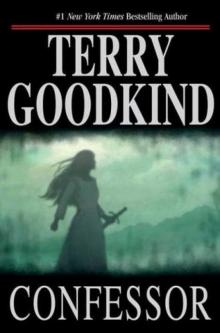 Confessor
Confessor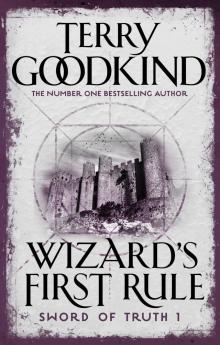 Wizard's First Rule
Wizard's First Rule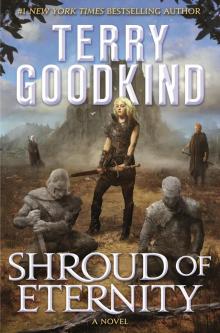 Shroud of Eternity
Shroud of Eternity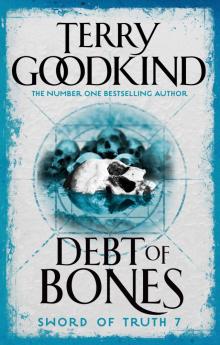 Debt of Bones
Debt of Bones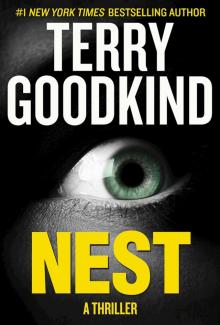 Nest
Nest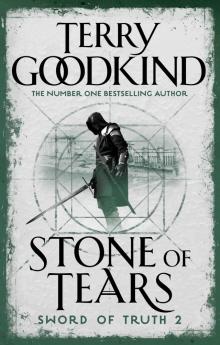 Stone of Tears
Stone of Tears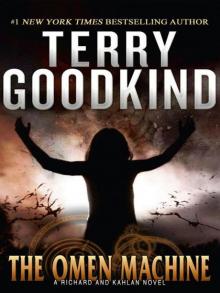 The Omen Machine
The Omen Machine The First Confessor
The First Confessor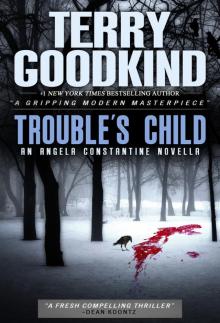 Trouble's Child
Trouble's Child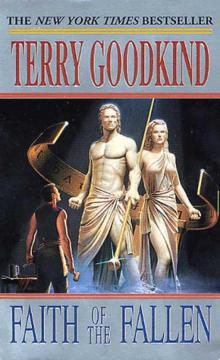 Faith of the Fallen
Faith of the Fallen Chainfire
Chainfire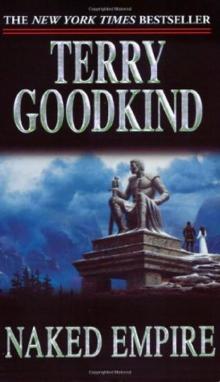 Naked Empire
Naked Empire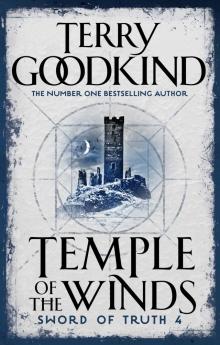 Temple of the Winds
Temple of the Winds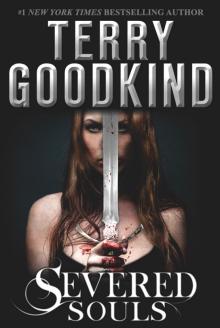 Severed Souls
Severed Souls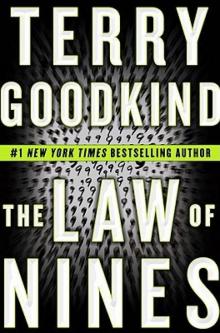 The Law of Nines
The Law of Nines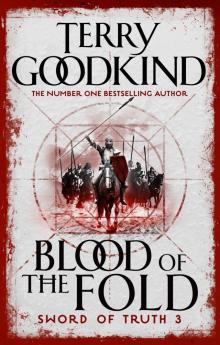 Blood of the Fold
Blood of the Fold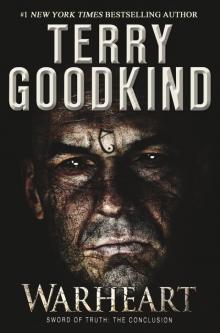 Warheart: Sword of Truth: The Conclusion
Warheart: Sword of Truth: The Conclusion The Sky People
The Sky People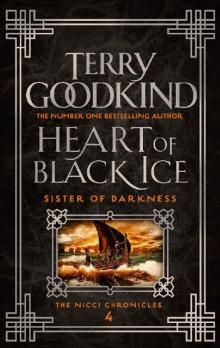 Heart of Black Ice (Sister of Darkness: The Nicci Chronicles Book 4)
Heart of Black Ice (Sister of Darkness: The Nicci Chronicles Book 4)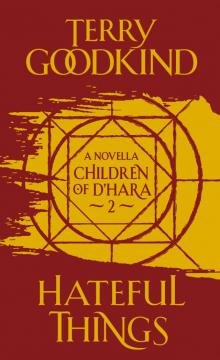 Hateful Things
Hateful Things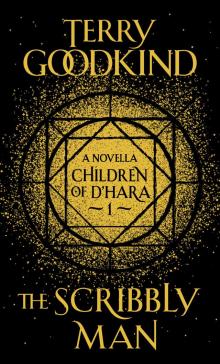 The Scribbly Man
The Scribbly Man The Pillars of Creation
The Pillars of Creation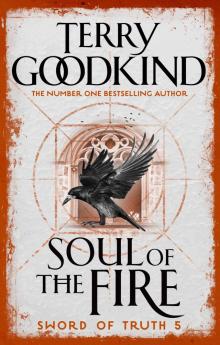 Soul of the Fire
Soul of the Fire Wasteland
Wasteland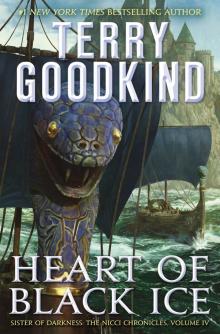 Heart of Black Ice
Heart of Black Ice Crazy Wanda
Crazy Wanda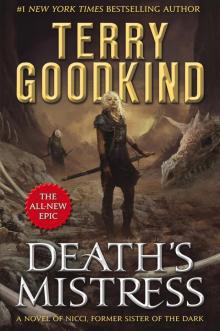 Death's Mistress
Death's Mistress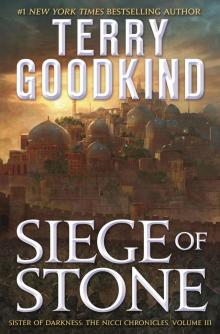 Siege of Stone
Siege of Stone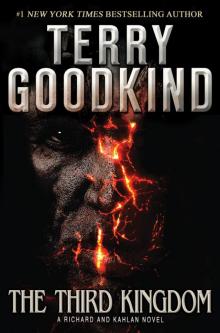 The Third Kingdom
The Third Kingdom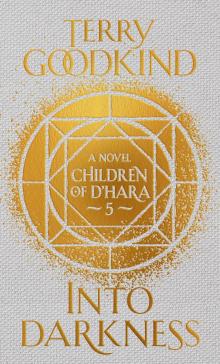 Into Darkness
Into Darkness The Girl in the Moon
The Girl in the Moon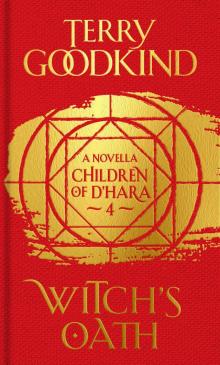 Witch's Oath
Witch's Oath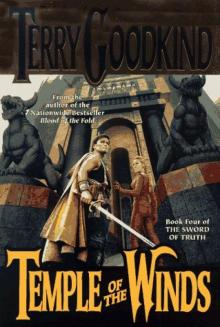 Temple of the Winds tsot-4
Temple of the Winds tsot-4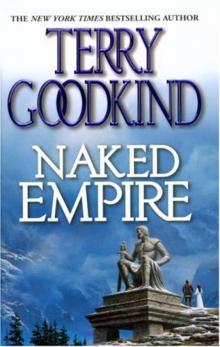 Naked Empire tsot-8
Naked Empire tsot-8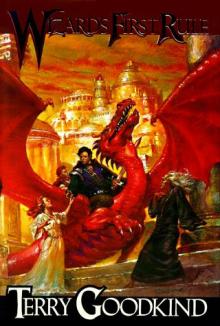 Wizard's First Rule tsot-1
Wizard's First Rule tsot-1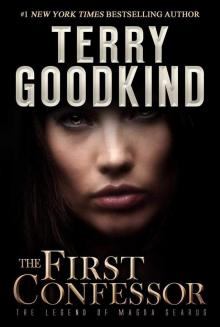 The First Confessor (The Legend of Magda Searus)
The First Confessor (The Legend of Magda Searus)![[Sword of Truth 9] - Chainfire Read online](http://i1.bookreadfree.com/i1/03/27/sword_of_truth_9_-_chainfire_preview.jpg) [Sword of Truth 9] - Chainfire
[Sword of Truth 9] - Chainfire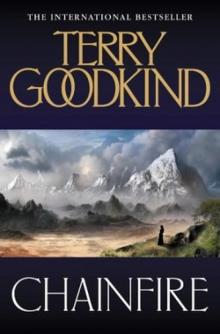 Chainfire: Chainfire Trilogy Part 1 tsot-9
Chainfire: Chainfire Trilogy Part 1 tsot-9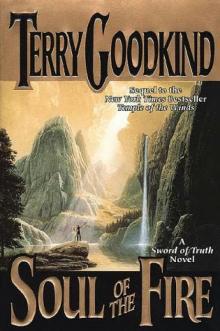 Soul of the Fire tsot-5
Soul of the Fire tsot-5 Pillars of Creation
Pillars of Creation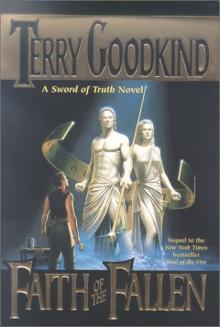 Faith of the Fallen tsot-6
Faith of the Fallen tsot-6 The Pillars of Creation tsot-7
The Pillars of Creation tsot-7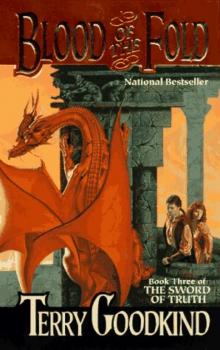 Blood of the Fold tsot-3
Blood of the Fold tsot-3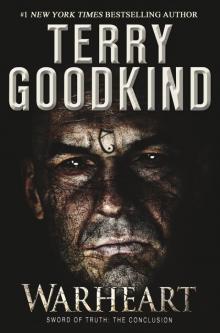 Warheart
Warheart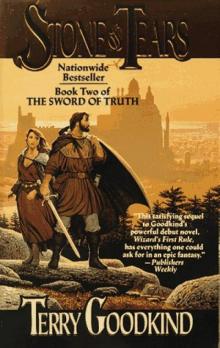 Stone of Tears tsot-2
Stone of Tears tsot-2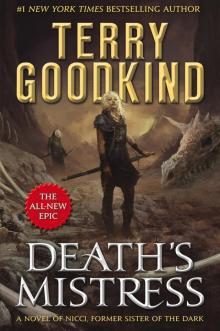 Death's Mistress--Sister of Darkness
Death's Mistress--Sister of Darkness Phantom: Chainfire Trilogy Part 2 tsot-10
Phantom: Chainfire Trilogy Part 2 tsot-10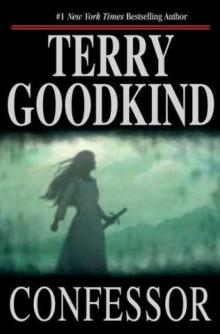 Confessor: Chainfire Trilogy Part 3 tsot-11
Confessor: Chainfire Trilogy Part 3 tsot-11